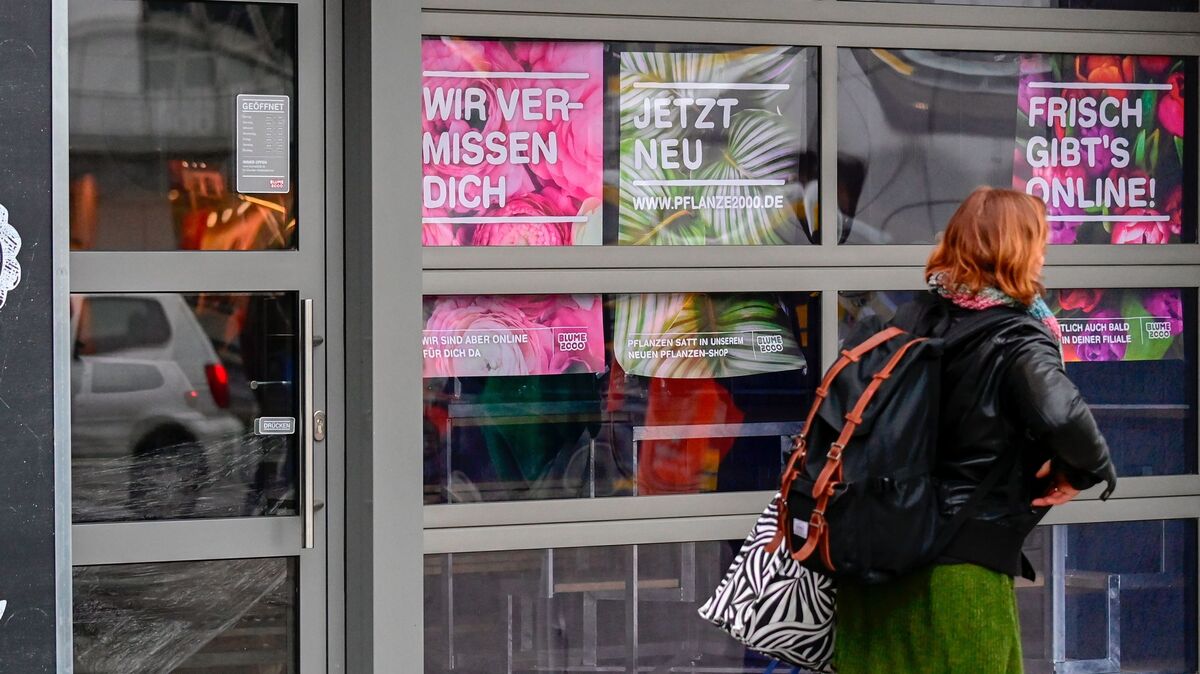
A woman walks previous a closed flower store in Berlin on Thursday. A investigate group pointed out additional than 1,200 new words and phrases in German influenced by the pandemic.
Tobias Schwarz/AFP by means of Getty Visuals
cover caption
toggle caption
Tobias Schwarz/AFP by means of Getty Photographs

A woman walks previous a closed flower shop in Berlin on Thursday. A study team mentioned much more than 1,200 new words and phrases in German influenced by the pandemic.
Tobias Schwarz/AFP through Getty Visuals
The pandemic has improved how persons talk and write. In English, dictionaries have noted a number of dozen new entries and revisions: social distancing, frontliner, tremendous-spreader, “Zoom” as a verb.
But in Germany, lexicographers at the Leibniz Institute for the German Language have compiled extra than 1,200 new words linked to the coronavirus pandemic.
German’s propensity for compounding phrases has been a massive element of the proliferation.
For illustration, Coronamutationsgebiet is an area wherever coronavirus mutations are popular. A Geisterveranstaltung (ghost function) is an occasion with no people today in attendance, normally athletics. Reside audio is allowed, presented the viewers continues to be in their vehicles, at an Autokonzert.
New nouns are normally fashioned in German by combining two or 3 nouns, suggests Anatol Stefanowitsch, a professor of linguistics at the Freie Universität Berlin.

“That’s 1 of the explanations for why we locate so lots of new words,” he tells Scott Simon on Weekend Version. “It is really just so straightforward to coin them. Many of these words and phrases vanish all over again immediately after they have been utilized once. But some of them have trapped all around.”
There are numerous versions on “experience mask.”
Mundschutzmode contains “Mund for mouth, Schutz for defense and Method as a time period for style. So a literal translation would be mouth defense trend,” Stefanowitsch suggests.
But Germans have also referred to a Gesichtskondom — a “confront condom,” which he notes makes a “novel picture” in your head. Behelfsmundnasenschutz would be an “improvised mouth nose defense.”
Maulkorb, or muzzle, is not on the record of new text. But persons opposed to mask needs are utilizing the word muzzle in a new way: “to portray adherence to wise public health and fitness actions as an act of submission beneath an authoritarian federal government,” Stefanowitsch says. “So that is been a stroke of genius from their standpoint.”
Only a smaller fraction of new pandemic phrases will likely make it into the dictionary. He thinks the kinds that are most exact have far more lasting likely.
“Kontaktbeschränkungen, contact limitations, and Ausgehbeschränkung, likely out limitations, those people are appealing,” he states.
“1 of the matters that the pandemic has genuinely demonstrated us is that men and women have been making an attempt to differentiate linguistically, making an attempt not to use way too powerful a word for a evaluate but also not trying to make it seem far too harmless. And so I believe people text, they are exciting, since they present the operate of language and the opportunity of language to build ever smaller distinctions in meaning to try to get issues precisely appropriate.”
There’s also a further emotional part of all this new language, in accordance to a person of the scientists at the Leibniz Institute.
“When new things materialize in the environment [we] glimpse for a identify,” Christine Möhrs informed The Guardian. “Factors that do not have a title can induce people to really feel concern and insecurity. Having said that, if we can talk about factors and title them, then we can talk with just about every other. Primarily in periods of crisis, this is essential.”
Peter Breslow and Kitty Eisele generated and edited the audio variation of this tale.
